Urban Fighting Rages In Gaza As Israel-Hamas War Enters Third Month

Heavy urban combat raged in and around Gaza's biggest cities Thursday as the bloodiest ever war between Israel and Palestinian militant group Hamas entered its third month since the October 7 attacks.
Vast areas of the besieged territory have been reduced to a rubble-strewn wasteland of bombed-out or bullet-scarred buildings as the death toll has soared above 16,200 according to the Hamas-run health ministry.
Israeli forces have tightened the noose around major urban centres in their hunt for Hamas over the surprise attack that officials say killed 1,200 in Israel, and to search for 138 remaining hostages.
Israeli forces backed by air power, tanks and armoured bulldozers were fighting Hamas in Khan Yunis, the biggest city in southern Gaza, as well as in Gaza City and the nearby Jabalia district in the north.
Prime Minister Benjamin Netanyahu said troops had closed in on the Khan Yunis house of Hamas's Gaza chief Yahya Sinwar, 61, and vowed that, although he could flee, "it is only a matter of time until we find him".
Air strikes also rained down on Rafah in Gaza's far south, a city near the Egyptian border that has been turned into a vast camp for many of the 1.9 million internally displaced Palestinians.
One of those on the move, Khamis Al-Dalu, told AFP that he had first fled Gaza City and then Khan Yunis for Rafah, where his family was now sheltered in a tent against the worsening winter chill.
"There was bombardment, destruction, leaflets dropped, threats and phone calls to evacuate and to leave Khan Yunis," he said about Israeli army warnings. "Where do you want us to go for God's sake?"
Eight more air strikes hit Rafah overnight, an AFP correspondent said, as the health ministry reported at least 37 people killed and many more wounded.
Searching for survivors and bodies in the dusty rubble, bereaved relatives carried away the remains of a little girl, wrapped in thin, flower-patterned fabric, said an AFP journalist.
Mass civilian casualties in the war have sparked global concern, heightened by dire shortages caused by an Israeli siege that has seen only limited supplies of food, water, fuel and medicines enter Gaza.
On Wednesday, Israel approved a "minimal" increase in fuel supplies to prevent a "humanitarian collapse and the outbreak of epidemics in the south of the Gaza Strip", said Netanyahu's office.
UN Secretary-General Antonio Guterres warned he expects "public order to completely break down soon due to the desperate conditions" in Gaza, with "potentially irreversible implications for Palestinians as a whole".
Israeli Foreign Minister Eli Cohen lashed out after the UN chief invoked a rare UN procedure to call for a ceasefire, charging that this would support Hamas and that Guterres' tenure was "a danger to world peace".
"We, too, want this war to end," Israeli government spokesman Eylon Levy told reporters. "But it can only end in a way that ensures that Hamas can never attack our people again."
Fighting raged on unabated as Israeli forces pushed on in their battle to kill militants and destroy their infrastructure, arms depots and tunnel shafts, hundreds of which it said it had blown up.
Three more Israeli soldiers were killed, raising the toll inside Gaza to 86, said the military.
The army said in a morning briefing that troops had "killed Hamas terrorists and struck dozens of terror targets" in Khan Yunis and raided a military compound of Hamas's Central Jabalia Battalion.
Israeli naval forces had also "struck Hamas military compounds and infrastructure using precise ammunition and firing shells".
Hamas released footage of its fighters shooting AK-47 assault rifles and grenade launchers from inside abandoned buildings in what it said was Gaza City as fires flare outside and smoke billowed into the sky.
The Islamist group said on social media channel Telegram that its fighters were engaged in fierce battles against Israeli troops "on all axes of the incursion into the Gaza Strip".
It said it had destroyed two dozen military vehicles in Khan Yunis and in Beit Lahia in the north of the territory.
Rocket fire from inside Gaza has continued to target Israel, where the projectiles have been intercepted by air defences.
The war has stoked fears that Israel and its ally the United States will face widening conflict with Iran-backed armed groups including Lebanon's Hezbollah, Yemen's Huthi rebels and others in Iraq and Syria.
A surge of deadly violence has also rocked the Israeli-occupied West Bank, where authorities say more than 250 Palestinians have been killed by Israeli fire or settler attacks since the war began.
The past two months have seen near-daily exchanges of fire across the UN-patrolled Israel-Lebanon border.
An investigation by Agence France-Presse into a strike in southern Lebanon on October 13 that killed a Reuters journalist and injured six others, including two from AFP, points to a tank shell only used by the Israeli army in this high-tension border region.
The months of fighting have inflicted a heavy toll on Palestinians inside Gaza, a territory that had been blockaded and poverty-stricken for years before the war, the fifth and by far the deadliest between Israel and Hamas.
"We are devastated, mentally overwhelmed," said Khan Yunis resident Amal Mahdi. "We need someone to find us a solution so we can get out of this situation."
Another Palestinian man, Ghassan Bakr, told AFP: "We arrived here, homeless. It rained on us last night. There is no food, no bread, no flour."
In Israel, traumatic memories of the October 7 attack remain raw, and millions hold grave fears for the remaining hostages as the country is set to observe the Jewish festival of Hanukkah.
Israel says 138 hostages remain in Gaza, after the release of 105, including 80 in exchange for 240 Palestinian prisoners, during a week-long truce late last month.
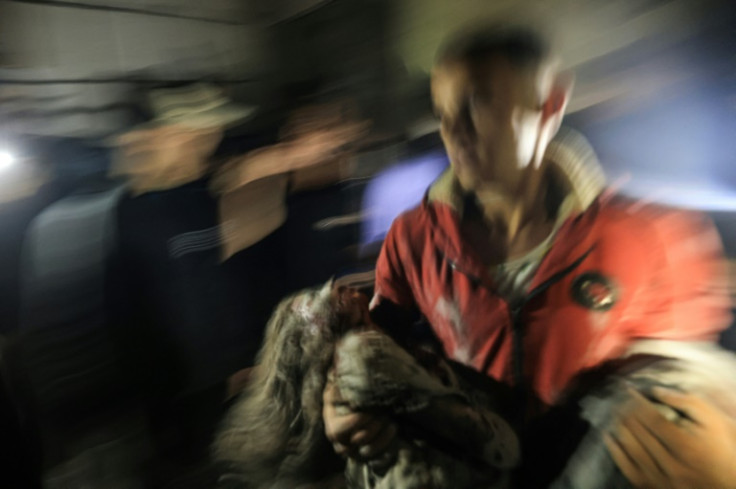
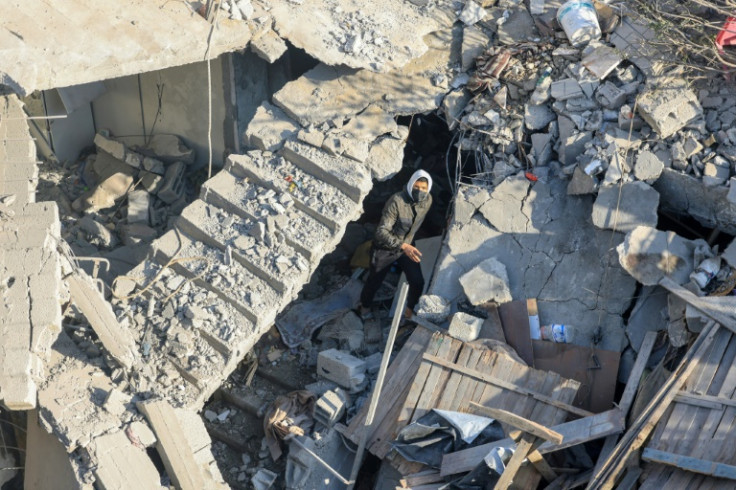

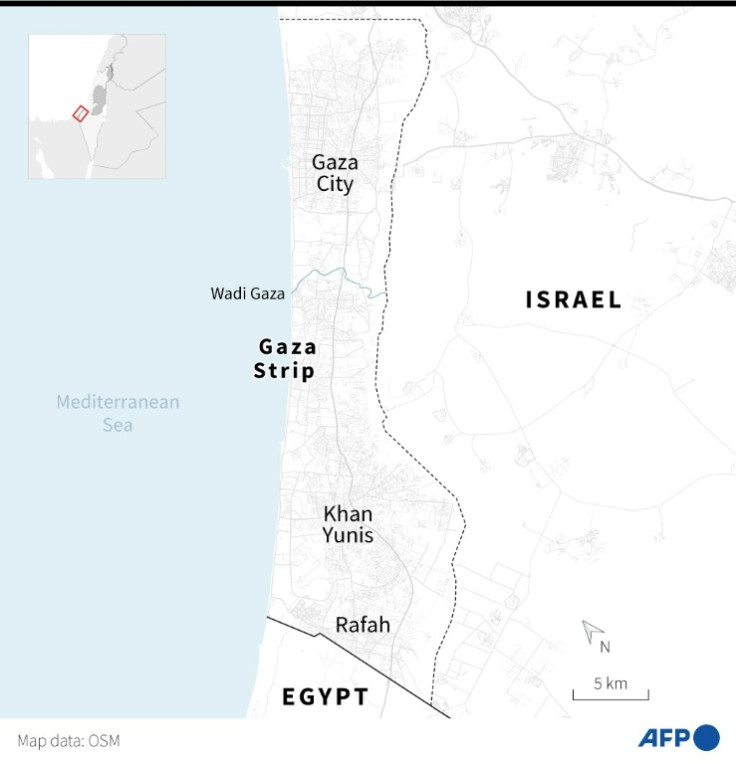
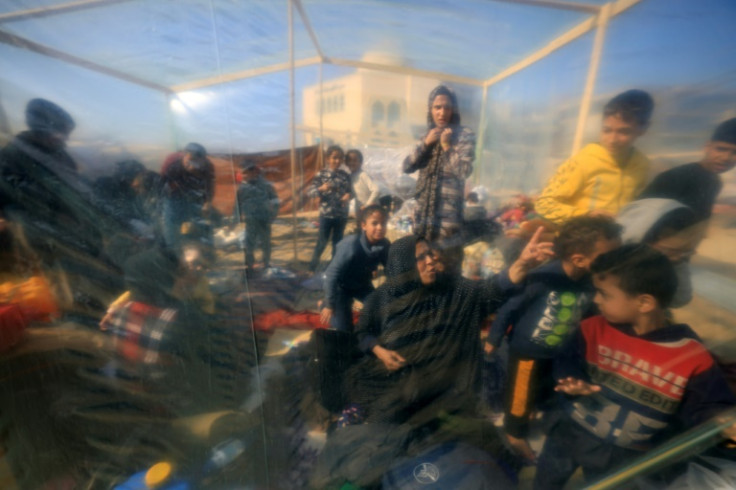

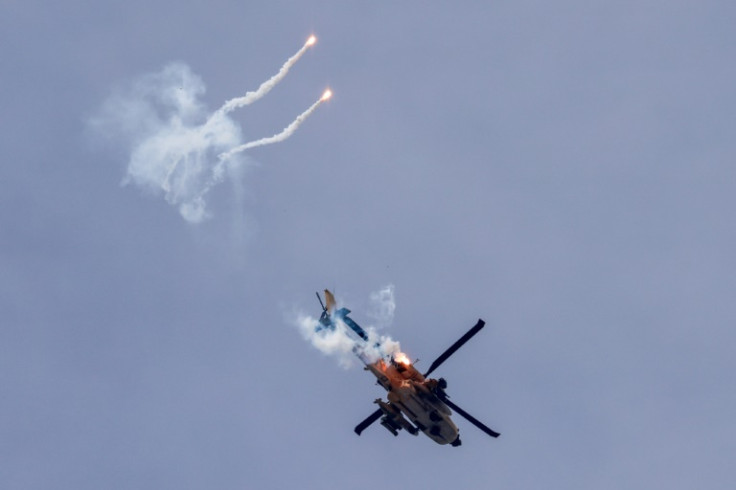
© Copyright AFP 2024. All rights reserved.





















